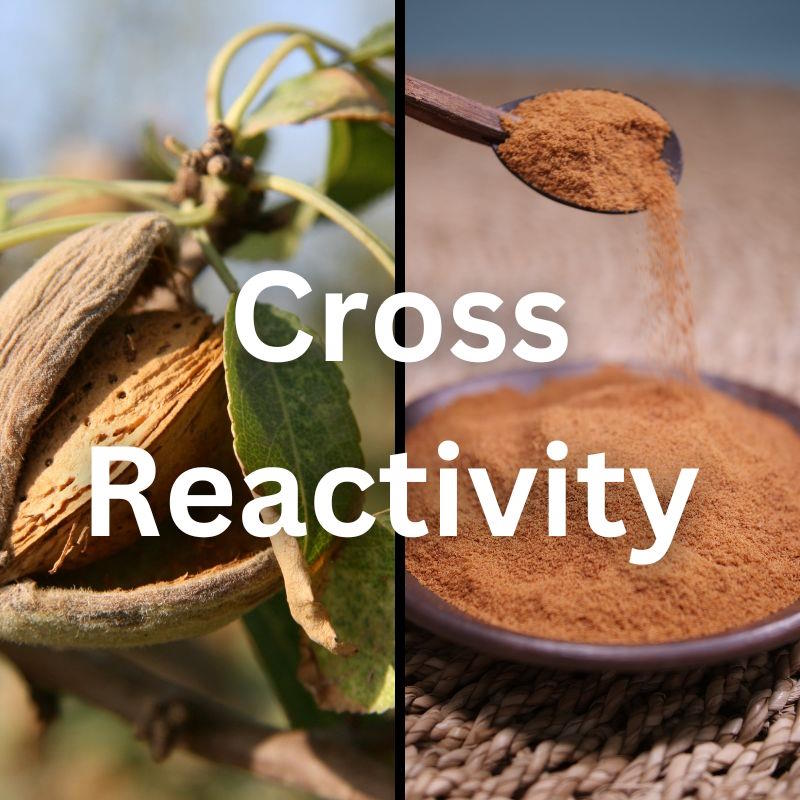No, cinnamon is not considered a nut allergy, cinnamon is a spice derived from the inner bark of several species of trees in the Cinnamomum genus. This bark is harvested and dried into rolls, which are then ground into a powder (cinnamon). Even though cinnamon is not a nut, it doesn’t mean that you can’t develop an allergy or sensitivity to it.

Table of Contents
Is cinnamon a nut?

Cinnamon is not a nut; it originates from the bark of trees within the Cinnamomum genus, rather than being nut-derived. For those cautious about nut allergies, cinnamon is often considered a safer choice due to its lack of shared allergenic proteins with nuts. Cinnamon is nut-free.
Is cinnamon safe for tree nut allergy sufferers?
Yes, cinnamon is most likely safe for tree nut allergy sufferers. Cinnamon is made from tree bark and not a tree nut, most allergists suggest that cinnamon is safe to consume if you have a tree nut allergy. However, it’s essential to be cautious about potential cross-contamination. If cinnamon is processed in facilities that also handle tree nuts, there might be a slight risk of cross-contact.
If you have concerns about consuming cinnamon due to your tree nut allergy, it’s a good idea to consult with an allergist or healthcare professional. They can provide personalized guidance based on your specific allergy and medical history.
Does cinnamon have nuts?

It’s essential to recognize that the production of cinnamon revolves around the extraction of the inner bark of these trees, which is then processed into the well-known spice. Therefore, individuals with nut allergies can generally consider cinnamon to be a safe and separate ingredient, unrelated to nut allergens.
The question of whether cinnamon has nuts is a common concern among those with allergies. To clarify, cinnamon is not associated with nuts in any form. Cinnamon trees, which belong to the Cinnamomum genus, do not produce nuts. Instead, they yield small berries that contain seeds. Throughout its growth and production process, no stage of the cinnamon plant involves the formation of nuts.
Can you be allergic to cinnamon?

Yes, it is possible to be allergic to cinnamon (spice allergy), and the allergy can develop at any point during your life. A cinnamon allergy is when your immune system sees cinnamon as a harmful invader (mistakenly) and produces histamines to try and protect your body from harm.
Cross-reactivity to Cinnamon

It is important for those with nut allergies or any other food allergy to be aware of cross-reactivity and how it could possibly affect them when eating different foods or ingesting certain substances like cinnamon.
Cross-reactivity is when a person has an allergic reaction, the proteins in one allergen might be similar to those found in another. The American Academy of Allergy, Asthma, & Immunology explains that if someone is sensitive to birch tree pollen; they may find that consuming apples results in a reaction as well.
While not everyone who has a tree nut allergy will be affected by cinnamon and vice versa, it is important for those who may have a potential risk of cross-reactivity to always read labels on products and discuss their food allergies with their doctor or allergist before trying something new.
Nut and Cinnamon Cross-Contamination

Nut processing can cause cross-contamination when other foods are processed in the same place. For example, if a tree nut you’re allergic to is processed in the same place as cinnamon, some of the nut’s proteins could get mixed with the cinnamon. This may cause you to have an allergic reaction.
Clarifying the Cinnamon & Nut Misinformation
Misinformation can easily spread, leading to unnecessary concerns. It’s essential to clarify that cinnamon is not a nut and does not share the proteins that trigger nut allergies. Cinnamon allergies are separate entities and should not be conflated with nut allergies.
Conclusion
In conclusion, the notion that cinnamon is linked to nut allergies is a misconception. Nut allergies are primarily caused by specific proteins found in nuts, whereas cinnamon is a spice derived from the bark of trees and does not contain these allergenic proteins. While cross-contamination is a possibility, reputable food manufacturers follow strict guidelines to prevent such occurrences.
If you have concerns about nut allergies, it’s vital to focus on accurate information and reliable sources. While cinnamon itself may not cause nut allergies, individuals with allergies or sensitivities should always read labels carefully and consult healthcare professionals when in doubt.
What has been your experience with nut, or cinnamon allergies? I would love to hear your story! Send me an email: Chris@allergypreventions.com
